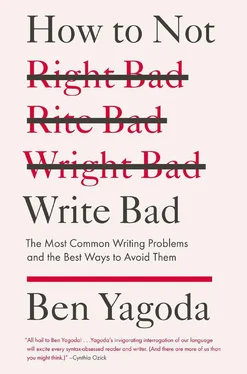Until Microsoft Word comes up with cliché-check to go along with spell-check, you’ll never be able to get rid of every single one. The best you can hope for is to manage them.
To that end, it’s useful to take a look at the life cycle of clichés. They are born as fresh, vivid figures of speech: often metaphors, on other occasions words or phrases used in an unexpected context. That means someone invented them. That is, a particular individual once thought to note of a not-especially-difficult enterprise, “It’s not brain surgery.” That was clever! The inventor deserved garlands and hosannas. Inevitably, other people started saying it as well. Over time, George Orwell observed in his classic essay “Politics and the English Language,” such formulations lose “all evocative power and are merely used because they save people the trouble of inventing phrases for themselves.” He dubbed them “dying metaphors,” another way of saying clichés.
Orwell conceived of this as one stage, but I think there’s a division within it that’s worth bearing in mind. Most tempting and insidious, and thus most important to guard against, are the clichés that seem to be in the very oxygen we breathe — dying metaphors like it’s not brain surgery and [anything] on steroids. Less of a problem is a category that could be called FFBC — clichés that are Famous For Being a Cliché. This would include such overworked expressions as at the end of the day and it is what it is and bromides and proverbs like it’s not the heat, it’s the humidity and a stitch in time saves nine. The world of sports is chock-full of these, for example, he came to play or he gave 110 percent. By this point, any conscientious writer knows these are off-limits; the vast majority of the time they come up in print is when they are mocked. (And rightfully so.)
Orwell observed that in the dying-metaphor stage, “incompatible metaphors are frequently mixed, a sure sign that the writer is not interested in what he is saying.” Good point.
The New Yorker used to sometimes print especially egregious examples at the ends of articles, under the heading BLOCK THAT METAPHOR! Here is one published in 1989, from a letter to the Boston Globe:
In the face of mounting pressure to gut or eliminate the IRS, it continues to shoot itself in the foot by biting the hand that feeds them.
Whew. The obvious and truly awful mixing is of hand-biting and foot-shooting, but note a phrase at the beginning of the sentence: “mounting pressure to gut.” Pressure and gut are metaphors as well, but a reader isn’t likely to notice them. That’s because they have arrived at the next, and final, stage of metaphorical life. After a certain number of years or decades in critical condition, a metaphor kicks the bucket and comes to seem more literal than figurative. Orwell says such a “dead metaphor…has in effect reverted to being an ordinary word and can generally be used without loss of vividness.” When we hear of a program being gutted , we don’t think of this as a metaphor at all and probably don’t perceive it as a cliché; it’s just a way of saying that the most important aspects of something were rudely removed. The same goes for referring to someone’s weakness as his Achilles’ heel , or even using a word such as astonished, which originally was a metaphorical suggestion of a shock so great it turned one to stone. These are okay to use, then. Just don’t use too many of them, and definitely don’t use more than one in the same sentence.
Here are a couple of mixed metaphors from student writing, with possible fixes.
[ The golden age of print journalism has rusted and there is a new age emerging from the wreckage — online journalism. ]
Golden age has reached the dead metaphor stage and is (barely) acceptable; however, wreckage introduces a whole other idea. My approach would be to stick with the golden-age thing and actually extend it into what the poets call a conceit . Also, has rusted is kind of flat and the word journalism is repeated. So I would do something like:
The golden age of newspapers has turned into a pile of rust. But some smart young reporters have taken some sandpaper to it and emerged with something shiny and new — online journalism.
[ The Christian Science Reading Room is a small cove of spiritual knowledge which historically has not been a beacon of popularity among college students. ]
Small cove of spiritual knowledge isn’t bad, but bringing in the beacon ruins the effect. I would go for something simple, just adding a little understatement at the end:
The Christian Science Reading Room is a small cove of spiritual knowledge that historically hasn’t been hugely popular among college students.
A few lines up, I said it was “barely acceptable” to use dead metaphors. If I don’t seem enthusiastic, that’s because, first, even a cliché which doesn’t smell bad anymore smells worse than something fresh, and, second, in a particular case, some people might feel it’s not dead yet (as Monty Python would put it), that it’s still a cliché. The bottom line is the importance of at least developing an awareness of the sell-by date on words and expressions, weighing them in your mind, and acting judiciously. (In that sentence, I used three metaphors: bottom line, sell-by date , and weighing. I decided that they were dead, not dying. What do you think?)
I’d like to add another stage Orwell didn’t think of, perhaps because he didn’t live in the Internet era, when everything, including clichés’ lives, moves much faster than it ever did before. In today’s highly interactive world, there is a period — between the invention of a metaphor and the point at which it is definitively arrived at cliché land — in which it’s not only usable but can be lively and fun.
Consider the expression [to] throw [someone] under the bus, meaning to publicly betray an erstwhile ally. The earliest use I have been able to find is a 1994 quote from a Pittsburgh Post-Gazette article: “Bethel Park council is delaying action on a site plan for an ice arena because of legal action by a citizens group opposing the project. Council president Philip Ehrman said the group is ‘trying to throw the community under the bus.’” It first showed up in the New York Times in 2000, but didn’t really take off till a few years later, with seven uses in 2005 and thirteen in 2006—including, crucially, a discussion in William Safire’s “On Language” column in November. Up until that point, I would submit, throw under the bus was a still-new toy with which writers could give readers some shared pleasure. This is a risky business, however, because different people will have different notions on where a particular phrase lies at a particular point in time.
There’s one more strategy for making a cliché acceptable: the old switcheroo. In 1937, Time magazine observed, “To the people who voted for him last November, Franklin Roosevelt was Mr. Right.” Since roughly that time, Mr. Right —meaning a male who is perfect husband material — has been a cliché. One strategy for making it (marginally) acceptable was Time ’s: that is, using it in a political as opposed to romantic context. There matters stood until 1985, when a television movie called Romance on the Orient Express contained this piece of dialogue: “I’m not looking for Mr. Right, I’m looking for Mr. Right Now.” Good show! The screenwriter tweaked the cliché and made it usable again. By now, of course, Mr. Right Now is as clichéd as it gets — and so is a recent (unisex) replacement, The One. Yet another variation would be needed to remove the stigma: Mr. Write for a dreamy literary guy, Mr. Left if the woman demanded a mate with progressive politics, Mr. Far Right for folks on the other end of the spectrum, Mr. Righter for someone chosen over a current beau, Mr. Rite Aid for a hypochondriac, Mr. Wry for an ironic sort, and so forth. You get the idea.
Читать дальше












